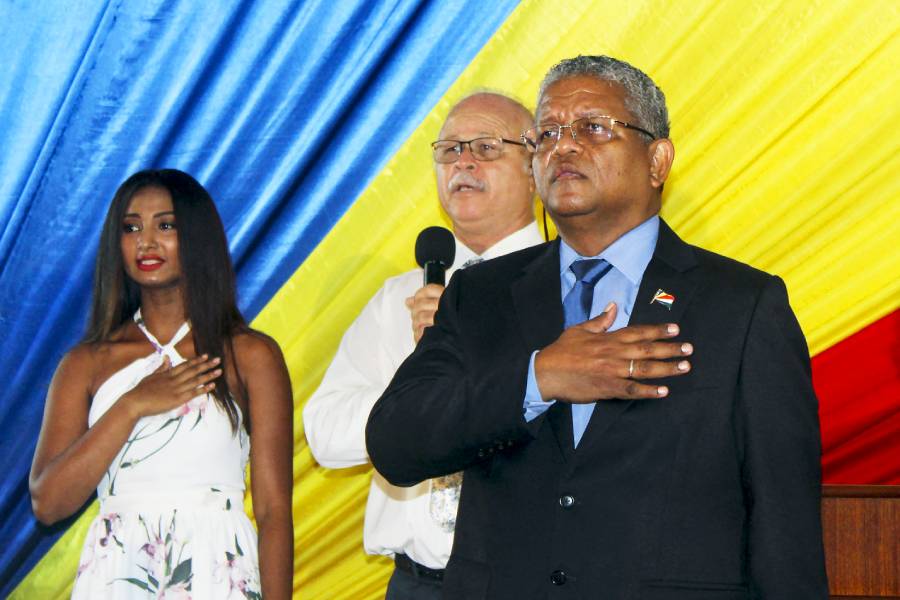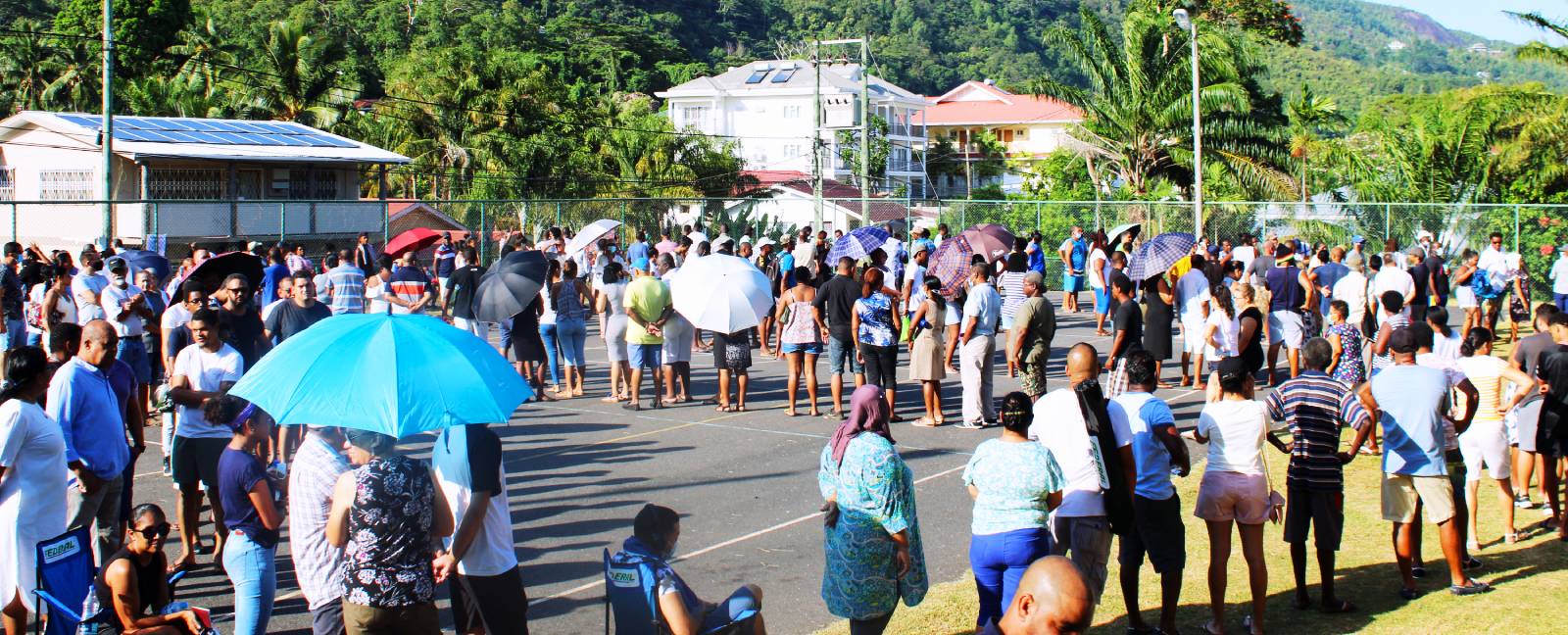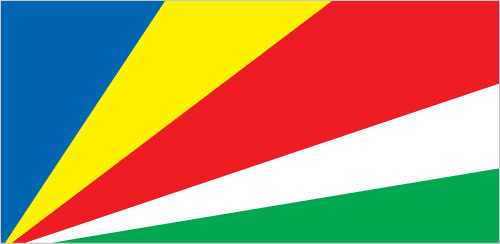« Previous: Malawi (September 16)
Next: Guinea (September/October) »
Presidential and Legislative
September 27
President Wavel Ramkalawan of the Linyon Demokratik Seselwa (LDS) party will be contesting for his second term as this 115-island archipelago nation in the Western Indian Ocean heads to the polls in 2025. A former Anglican priest, Ramkalawan’s victory in the 2020 elections (his sixth try for the presidency) was a watershed moment for the country of 122,000. The United Seychelles party and its predecessor, the Seychelles People’s Progressive Front, had dominated political institutions in Seychelles since a coup by Albert René in 1977 (1 year after independence from Britain). While multiparty politics were introduced in the early 1990s, the United Seychelles maintained majorities in the National Assembly until 2016 and the presidency until 2020.

President Wavel Ramkalawan (R) looks on during his inauguration on October 26, 2020. (Photo: AFP/Rassin Vannier)
Ramkalawan will be facing Dr. Patrick Herminie, this year’s standard bearer of United Seychelles. Herminie served as the Speaker of the National Assembly from 2007 to 2016, and previously was Director General of Primary Health Care at the Ministry of Health.
A focus for both candidates will be on reducing the country’s 23-percent poverty rate and expanding the middle class in a country with a per capita income of over $17,000, the highest in Africa.
While René died in 2019, Seychelles continues to grapple with reverberations from his long stranglehold on power. Crimes committed during the René era, including patronage and torture, became public during a truth and reconciliation process launched in 2018 and culminating in a final report in 2023. The report included calls for reparations to victims, including apologies and monetary compensation.
Investigations into the René era has resulted in arrests in 2021 over allegations of $50 million in money laundering, involving a Seychellois businessman and the United Arab Emirates government. Searches in the case revealed a cache of arms, generating additional arrests, including of a former senior officer of the Seychelles Defence Forces and Sarah Zarqhani René, the wife of the former president. The cases continue to wind their way through the justice system and provide additional backdrop to the 2025 elections.
A focus for both candidates will be on reducing the country’s 23-percent poverty rate.
They also reflect the ongoing efforts to unravel the cronyism that gained traction within state institutions during the country’s long period of one-party rule. This includes elevating standards of transparency. The National Assembly passed an anticorruption law in 2016 that established the Anti-Corruption Commission of Seychelles (ACCS). The law was amended in 2019 to increase the number of ACCS commissioners and strengthen the Commission’s investigative powers and law enforcement provisions. Seychelles was removed from a European Union list of foreign tax havens in 2021, and the country now ranks 20th out of 180 countries on Transparency International’s Corruption Perceptions Index, the highest of any African country, and an eight-place improvement since 2018.
Seychelles has also made strides in building an independent media. Several newspapers exist besides the state-owned daily. A private television station and two radio stations provide programming alongside the state broadcaster. To mitigate political or communal polarization, the country prohibits political parties and religious organizations from operating public radio broadcasts. To provide further safeguards for independent media, the National Assembly decriminalized defamation in 2021, citing reforms undertaken, and enhanced training for journalists. Seychelles ranked first in Africa in the Varieties of Democracy global press freedom index.

Voters queue at a polling station on the main Island of the Seychelles, on October 24, 2020, during the presidential and legislative elections. (Photo: AFP/Rassin Vannier)
Civilian authorities exercise effective control over a small but well-trained and professional security force. The Seychelles Defence Forces (SDF) are comprised of a 300-strong coast guard, which includes an 80-person air wing. In June 2022, the National Assembly gave the SDF the right to enforce domestic law, effectively removing the separation between police and military. This law prompted a petition to the Constitutional Court by human rights groups for its threat to due process and the rule of law—a case that remains under review.
The SDF’s primary focus is disrupting piracy, illicit trafficking networks, and unsanctioned fisheries in Seychelles’ 1-million-km2 exclusive economic zone. Seychelles is an important regional player in the fight against piracy off East Africa, having held more than 17 trials of 142 suspected pirates since 2009.
Seychelles plays a vital role in maintaining open sea-lanes and protecting the marine environment. This places it in the nexus of competing geostrategic interests between China and India.
Given its location in the Western Indian Ocean, Seychelles plays a vital role in maintaining open sea-lanes and protecting the marine environment. This also places it in the nexus of competing geostrategic interests between China and India. India had negotiated an agreement with the previous Seychellois government to establish a naval base on Seychelles’ Assumption Island. The Ramkalawan government has paused this agreement to avoid being pulled into geostrategic rivalries and to consider the environmental impacts. China, meanwhile, has stepped up its diplomatic outreach to each of the region’s island nations—Comoros, Madagascar, Maldives, Mauritius, and Seychelles.
Seychelles’ continued economic dynamism remains closely linked to a stable blue (maritime) economy. Roughly 45 percent of the country’s gross domestic product is tied to tourism. It is therefore vulnerable to external shocks, such as the COVID pandemic that curtailed international travel. The fisheries sector is a second pillar of the economy, which is highly dependent on maintaining the health and biodiversity of the maritime ecosystem. Seychelles is likewise focused on mitigating climate risks that can trigger devastating cyclones, monsoon rains, floods, landslides, and rising sea levels.
As Seychelles prepares for a competitive 2025 election, how the country continues its push for transparency, expands benefits to all citizens, and manages its evolving security threats will be key issues to watch.
Hany Wahila is a Research Assistant with the Africa Center for Strategic Studies.
Previous
« Malawi (September 16)
Next
Guinea (September/October) »


 Seychelles: Democratic Resiliency Advancing Economic Progress and Security
Seychelles: Democratic Resiliency Advancing Economic Progress and Security